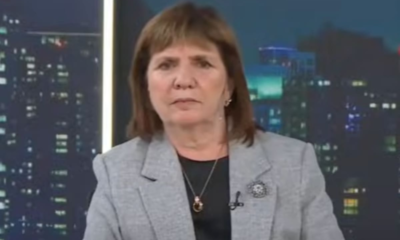INTERNACIONAL
State of War: How Trump is fighting a 9-front battle
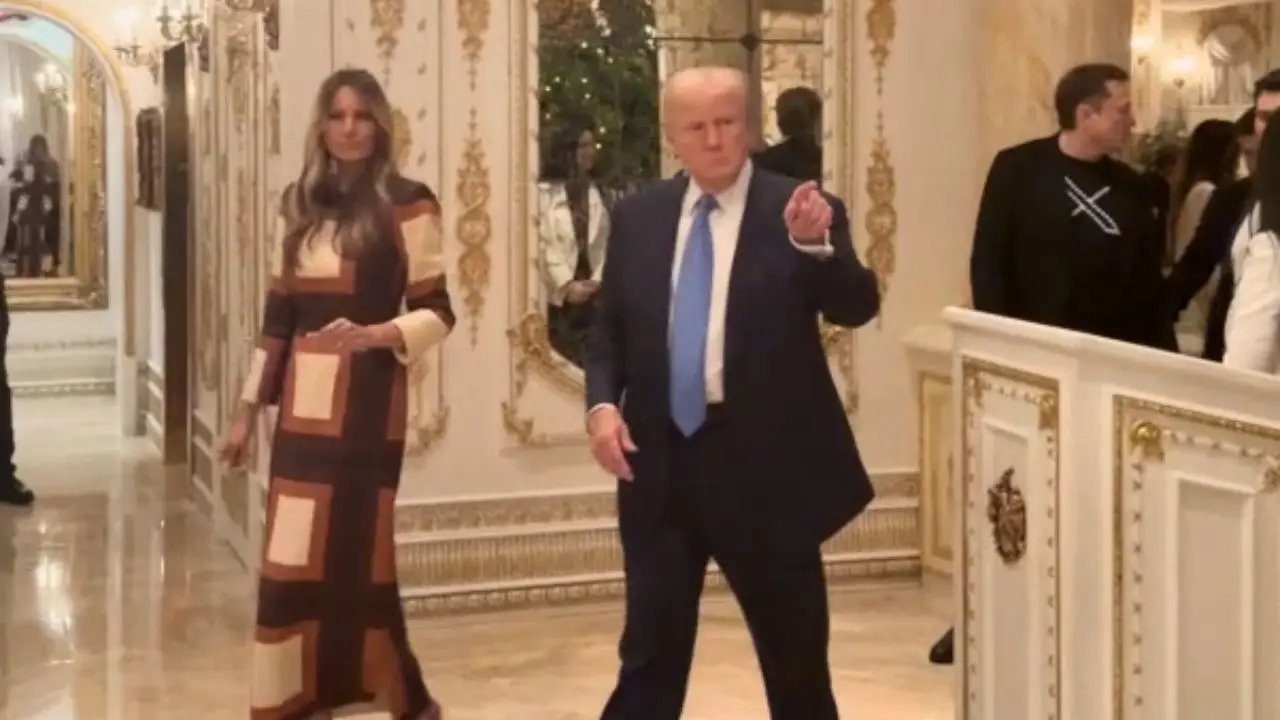
President Trump is fighting a war with many battlefields.
It’s a nine-front crusade, although I could easily double that number.
If there’s a common thread here, it’s the president taking on elite institutions that he has long resented or reviled.
That’s why his first three months seem stuck on hyperspeed – critics would say chaos – because he’s broken with the traditional model of tackling one or two issues at a time. Voters gave him a second term to shake things up. It’s the first Trump term on steroids.
EDUCATION DEPT. TO RESUME COLLECTIONS ON DEFAULTED FEDERAL STUDENT LOANS FOR FIRST TIME SINCE 2020
The president is surrounded by loyalists who encourage his flood-the-zone approach, unlike some of the more traditional figures (Rex Tillerson, Jim Mattis, Gary Cohn) who tried to restrain him the last time he lived in the White House.
One advantage is that he uses Truth Social as a weapon, unloading on those who displease him.
And yet he still finds time to abolish rules limiting shower pressure, call for the abolition of pennies, and come out against changing clocks (though his stance on daylight savings is unclear) – all matters that affect people’s daily lives.
Here, in no particular order, are Donald Trump’s nine battlegrounds:
1. TOP PRIVATE UNIVERSITIES
Although Trump himself went to the Wharton School, he is constantly attacking Columbia and other top Ivy colleges. Harvard, where he has frozen more than $2 billion in federal funding and another $7 billion is at risk, is fighting back. Plus, the IRS is looking at revoking the university’s tax-exempt status.
Trump has publicly criticized Harvard University multiple times in recent weeks. (Getty Images | iStock)
The White House now admits that the letter a Trump official transmitted to Harvard was «unauthorized» and should not have been sent. Harvard officials were stunned because they thought they were in the process of negotiating a settlement with the administration.
2. LAW FIRMS
One giant law firm after another, under pressure from Trump, has caved and reached settlements with the White House. This involves agreeing to provide up to $100 million or even $125 million in pro bono services on matters important to the administration. The alternative is an executive order pulling its members’ security clearances, making it impossible to serve their corporate clients without access to secret data. A few firms have fought back, and some attorneys have resigned in protest, but most are volunteering to settle.
3. MEDIA
President Trump has sued CBS, NBC and Gannett. He won a $16-million lawsuit against ABC–approved by Disney–after George Stephanopoulos repeatedly called him a rapist when he was actually held liable for sexual abuse. Even if the suits go nowhere, journalists and news outlets have to hire lawyers and go through an ordeal.
MARK ZUCKERBERG ON THE STAND: ‘CRAZY,’ ‘SCARY’ IDEAS LED HIM TO BUY INSTAGRAM AND WHATSAPP
Trump has long used the press as a foil, but now he ridicules the likes of CNN’s Kaitlan Collins when she tries to ask questions. He refused to take a question from an NBC reporter, saying the network has no credibility. And yet Trump provides an absolutely stunning degree of access. He takes questions virtually every day and has taken over the press pool (with the AP still excluded). The coverage is overwhelmingly anti-Trump–sometimes that’s self-inflicted–but that also boosts clicks and ratings. It’s a love-hate relationship.
4. FEDERAL RESERVE
The markets nose-dived again yesterday as Trump stepped up his personal assault on Fed Chairman Jerome Powell in an obvious attempt to pressure him into resigning. Powell’s job is to worry about inflation, not to goose the economy because the president wants him to cut interest rates.
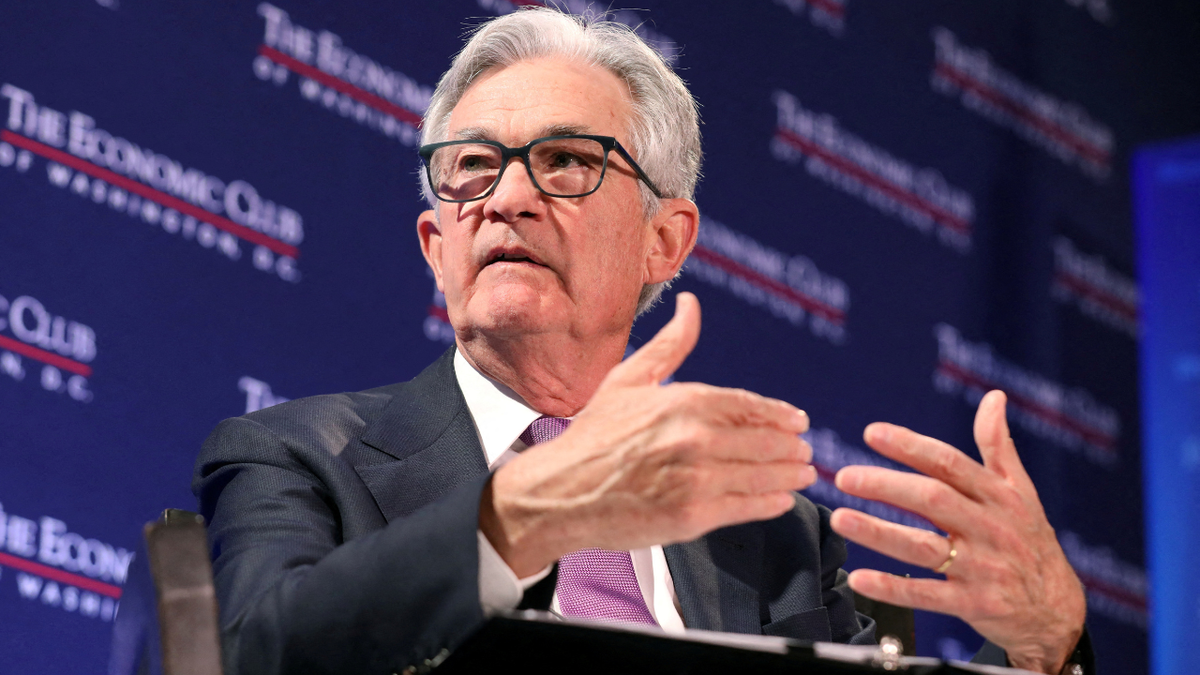
U.S. Federal Reserve Chair Jerome Powell responds to a question from David Rubenstein (not pictured) during an on-stage discussion at a meeting of The Economic Club of Washington, at the Renaissance Hotel in Washington, D.C., U.S, February 7, 2023. (REUTERS/Amanda Andrade-Rhoades/File Photo)
The entire tariff war has spooked Wall Street and alienated such allies as Canada (the 51st State???), Mexico and the European Union. He repeatedly promised a tariff war during the campaign, but no one expected tariffs of this magnitude, even against China, which has retaliated. Now Trump says he’ll even work out a deal with China. The 90-day pause briefly seemed to stabilize things, but whether the president can strike deals with 90 countries in 90 days remains to be seen.
5. COURTS
Donald Trump has a long history of attacking judges and prosecutors. Now he is going up to the line, and perhaps crossing it, when it comes to challenging court rulings, even with a 6-3 conservative majority on the Supreme Court.
The other day, the president deflected questions about the wrongful deportation of Kilmar Abrego Garcia, telling reporters to speak to the lawyers. The next day, he unloaded at length on Abrego Garcia, saying he’s a violent man who deserves to be in prison and criticizing Chris Van Hollen’s trip to visit him in a carefully staged photo op.
Abrego Garcia may well be a gang member, but a previous court ruling had found he should not be sent to El Salvador. Politically, this is a winning issue for Trump. But when SCOTUS ruled 9-0 that he should «facilitate» Garcia’s return, Trump pretty much ignored it.
TRUMP SAYS HE’S ‘NOT HAPPY’ WITH FED CHIEF JEROME POWELL
In a separate case, the Supreme Court, 7-2, ordered Trump not to move a second wave of Venezuelan migrants from where they are being held. This time, the administration agreed to follow the ruling.
6. FORMER AIDES
The president is going after two of his appointees from the first term.
He has ordered an investigation of his former cybersecurity chief, Chris Krebs, for «falsely and baselessly» denying that the 2020 election was rigged. He called Krebs a «significant bad-faith actor who weaponized and abused his government authority,» meaning Krebs found what every other probe, including one by Attorney General Bill Barr, found–no evidence of significant fraud.
Trump also ordered a probe of Miles Taylor, better known as «Anonymous,» for the New York Times op-ed he wrote ripping the president.
Taylor, a former Homeland Security official, «wrote a book under the pseudonym ‘Anonymous,’ making outrageous claims both about your administration and about others in it,» the president was told in a memo. So he too is under investigation. Trump even accused Taylor of committing «treason.»
7. HILL REPUBLICANS
The president has pressured members of his own party into going along with just about anything he wants. Other than the Matt Gaetz fiasco, that has meant approving all his nominees, despite doubts about the likes of Pete Hegseth and RFK Jr.
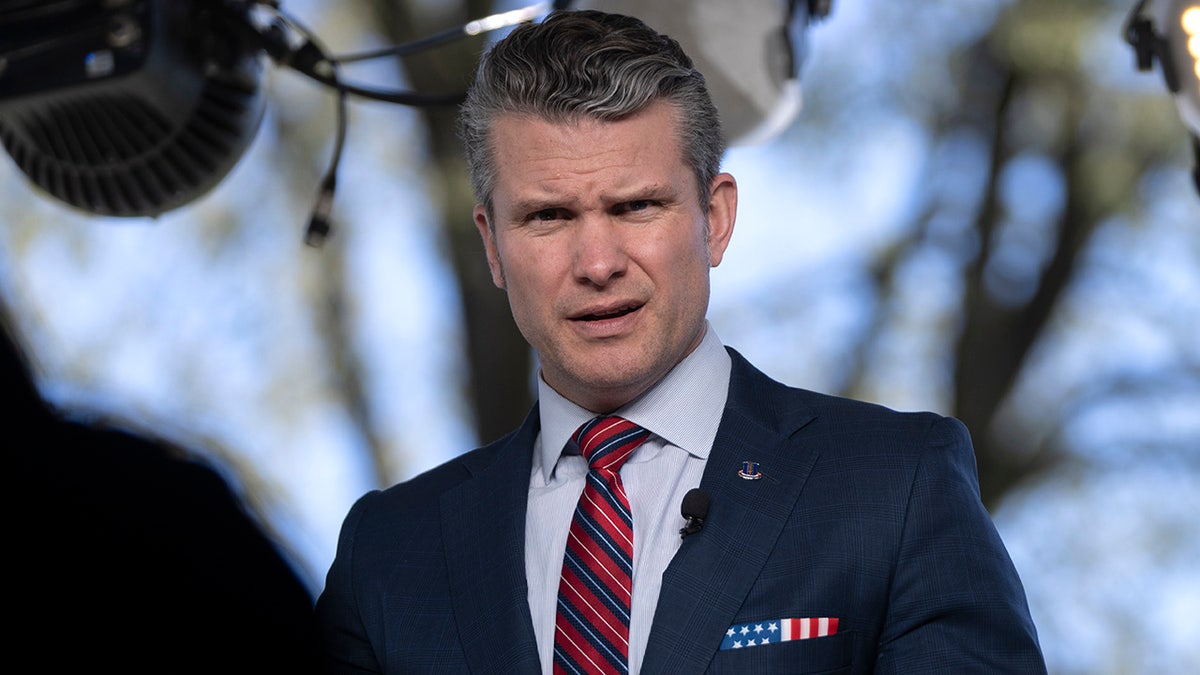
Defense Secretary Pete Hegseth prepares to give a television interview outside the White House, on Friday, March 21, 2025, in Washington. (AP/Mark Schiefelbein)
He has openly warned that he will use Elon Musk’s money to launch primary opponents against those who defy him. Musk has been a heat shield for Trump, though he has broken with him on tariffs. Remember that Musk poured money into that Wisconsin Supreme Court battle and lost. The chainsaw looks very different now.
While the violent attacks against Tesla have been despicable, Musk has also had to admit, after vowing to cut $1 trillion, that he’ll only be able to save $150 billion. Musk also admitted firing and having to rehire bird flu experts and nuclear bomb specialists, but remains the world’s richest man.
Lisa Murkowski just came out and said it: They are all afraid to criticize Trump for fear of political retaliation.
8. KENNEDY CENTER
It’s never been done, but the president fired all the Democratic board members and named himself chairman. He’s even suggested that he should host the annual awards given out for the glittering building on the Potomac named for JFK – not because he needs the attention, he says, but because it would be good for ratings.
The board has always been bipartisan, but that doesn’t bother Trump.
Some performers, led by Lin-Manuel Miranda of «Hamilton» fame, have already pulled out. Will only conservative performers get the green light?
I’ve picked the Kennedy Center as an example of Trump’s culture wars, but he’s also taken aim at the Smithsonian Institution and the National Zoo.
9. VOLODYMYR ZELENSKYY
The president, with help from JD Vance, utterly humiliated the Ukrainian president during that meltdown meeting at the White House. Now Zelenskyy bears a good bit of responsibility for the clash – he should have kept his mouth shut and walked away with an agreement, but took the bait.
Trump went a step further, kicking him out of the White House and sending him home.
CLICK HERE TO GET THE FOX NEWS APP
Now Trump, through Marco Rubio, says he may give up on negotiating a cease-fire in Ukraine. That’s exactly what Vladimir Putin wants, so he can keep on seizing land from the brave Ukrainians. One thing that Trump said he would do, but hasn’t done, is pressure his pal Putin. He still blames Zelenskyy and Ukraine for having the temerity to be invaded by the Kremlin.
That’s the list. Feel free to create your own. Sometimes it works for Donald Trump, sometimes it doesn’t. But it helps explain the dizzying pace of change and sends an unmistakable message that he is in charge.
Media,Media Buzz,US,Donald Trump,Politics,JD Vance,Elon Musk,US Education,Federal Reserve
INTERNACIONAL
Schumer, Democrats try to save face, blame GOP for possible government shutdown
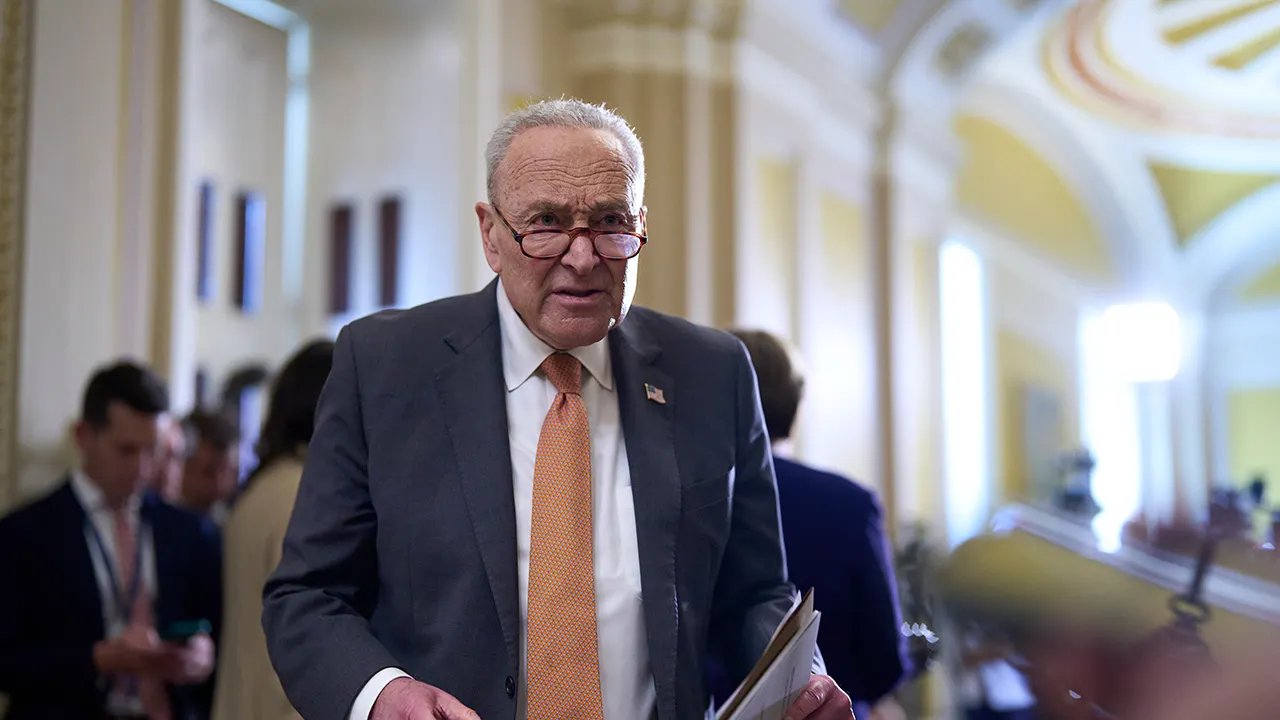
NEWYou can now listen to Fox News articles!
Congressional Democrats are trying to get on the same page and display a unified front after threatening to derail the government funding process.
Senate Minority Leader Chuck Schumer, D-N.Y., and House Minority Leader Hakeem Jeffries, D-N.Y., met behind closed doors Tuesday night, along with the top Democrats in the House and Senate Appropriations Committees, to plot a course forward in the forthcoming government funding fight.
SENATE WEATHERS DEM OPPOSITION, ADVANCES FIRST GOVERNMENT FUNDING BILL
Senate Minority Leader Chuck Schumer, D-N.Y., turns to an aide during a news conference at the Capitol in Washington, D.C., on June 3, 2025. (AP Photo/J. Scott Applewhite)
The meeting came after Democrats in the upper chamber overwhelmingly supported the first government funding bill to hit the Senate floor, one that would fund military construction and Veterans Affairs. Ahead of the vote, Senate Democrats had signaled they may vote against the bill and further obstruct the appropriations process because of highly partisan legislation rammed through the upper chamber by Senate Republicans.
«We all want to pursue a bipartisan, bicameral appropriations process,» Schumer said. «That’s how it’s always been done, successfully, and we believe that, however, the Republicans are making it extremely difficult to do that.»
The meeting just off the Senate floor was meant to get congressional Democrats on board with a messaging plan over the next weeks and months ahead of the Sept. 30 deadline to fund the government.
CONGRESSIONAL REPUBLICANS FACE BRUISING BATTLE TO AVOID GOVERNMENT SHUTDOWN
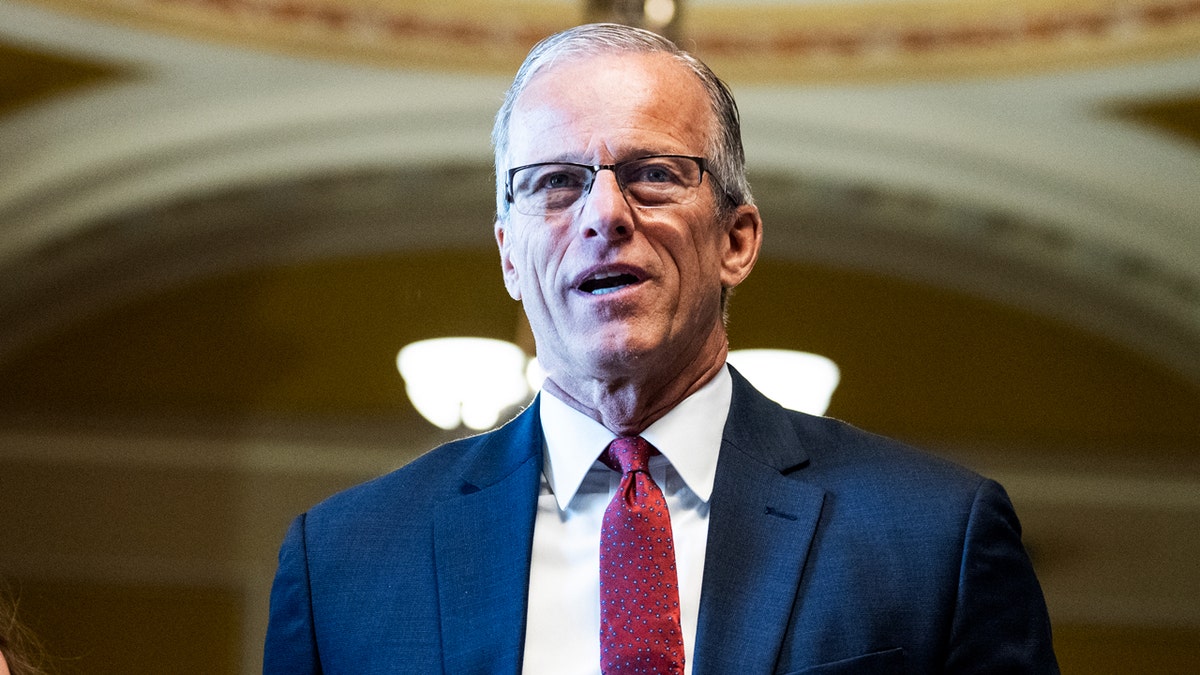
Senate Majority Leader John Thune, R-S.D., is seen after the Senate luncheons in the U.S. Capitol on June 24, 2025. (Tom Williams/CQ-Roll Call, Inc via Getty Images)
It was also likely designed to prevent a repeat of the Democratic debacle in March, when Schumer broke with Jeffries and threatened to shutter the government before ultimately caving and providing Republicans the votes necessary to advance yet another government funding extension, known as a continuing resolution.
Republicans are quick to point out that when Schumer led the upper chamber, none of the House GOP’s spending bills made it to the floor — in Congress, the spending process begins in the lower chamber.
Since taking over earlier this year, Senate Majority Leader John Thune, R-S.D., has committed to returning to regular order, or passing each of the dozen spending bills to fund the government, and trying to get the appropriations process back to normal.
However, it’s a feat that hasn’t been successfully done in Washington since the late 1990s.
«Frankly, I think a lot of us around here think [this] is long overdue,» Thune said.
However, Democrats contend that their trust in Republicans is wearing thin after two major partisan bills, one being President Donald Trump’s «big, beautiful bill,» and the other the president’s $9 billion clawback package, were pushed through the chamber without any Democratic input.
‘BAIT AND SWITCH’: SCHUMER WARNS OF BITTER FUNDING FIGHT OVER GOP CUTS PLAN

Representative Hakeem Jeffries, a Democrat from New York, speaks during a news conference at the U.S. Capitol in Washington, D.C., on Feb. 6, 2025. (Tierney L. Cross/Bloomberg via Getty Images)
Thune argued that Senate Democrats were using the rescissions package to shut down the appropriations process and effectively shut down the government.
In the Senate, most bills that come to the floor require at least 60 votes to smash through the filibuster, meaning that most legislation requires bipartisan support to some extent.
Earlier this year, the House GOP produced a partisan government funding extension that was a tough pill for Senate Democrats to swallow, but they still ultimately opted to vote for it. This time around, they’re demanding more involvement in the process.
CLICK HERE TO GET THE FOX NEWS APP
Jeffries said that congressional Democrats would play ball if the process was «bipartisan and bicameral in nature» and put the onus of a partial government shutdown at the feet of congressional Republicans.
«House Republicans are, in fact, marching us toward a possible government shutdown that will hurt the American people,» he said.
However, House Speaker Mike Johnson, R-La., threw the responsibility on Democrats over whether the government would shutter or stay open come the end of September.
«They’re gaming out how they can shut the government down,» Johnson told Bloomberg Government.
INTERNACIONAL
Ucrania: el presidente Volodimir Zelenski enfrenta críticas y protestas por una nueva ley anticorrupción
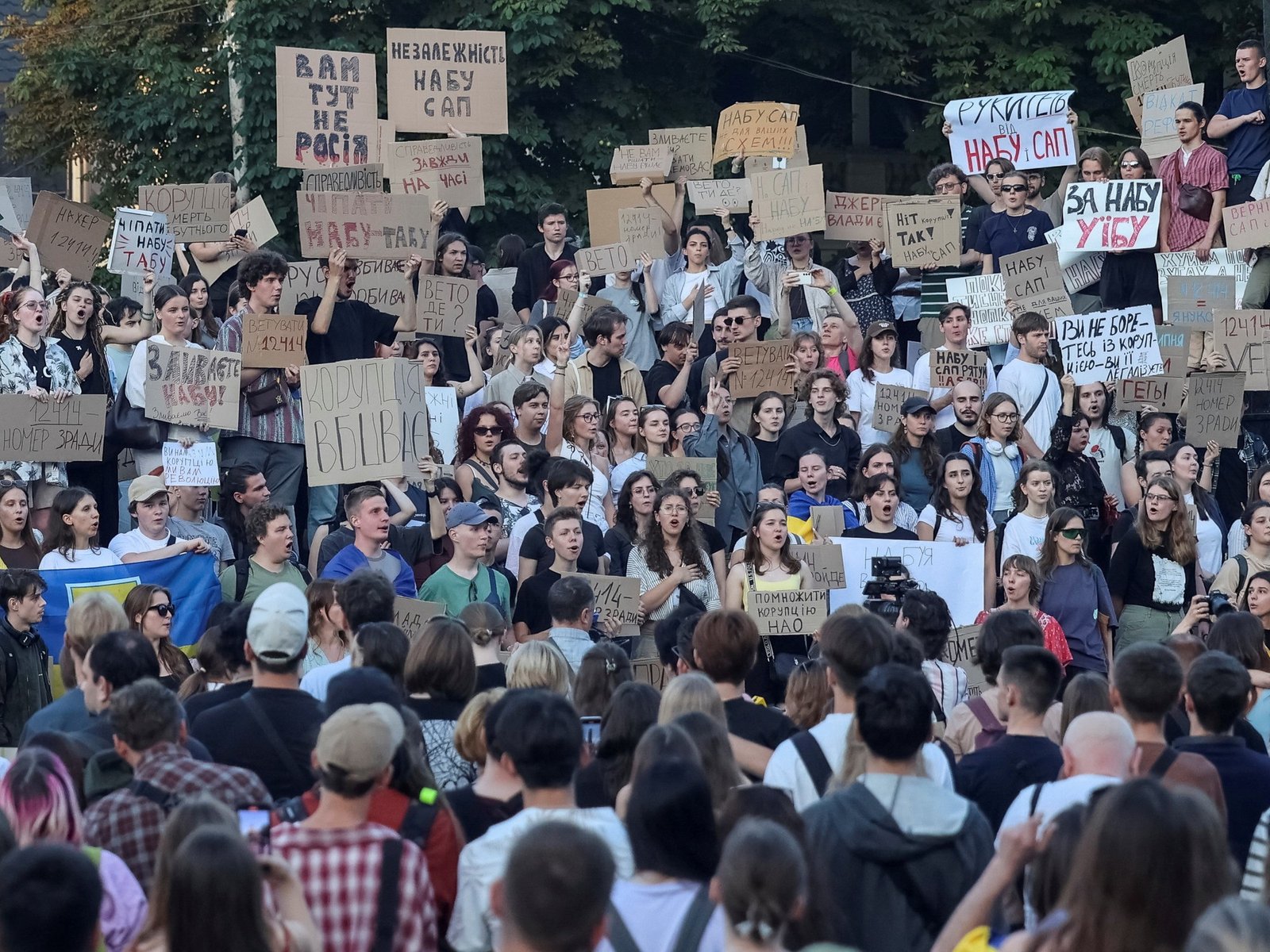
Advertencia de funcionarios de la UE
Negociaciones en Estambul
Ucrania,Volodímir Zelenski,Rusia,Guerra Rusia-Ucrania
INTERNACIONAL
Trump admin official to meet with Israel, Qatar amid push for Gaza ceasefire

NEWYou can now listen to Fox News articles!
Special Envoy Steve Witkoff is expected to meet with Israeli and Qatari officials in Rome on Thursday as the U.S. pushes for a ceasefire deal in Gaza.
Hamas and Israel are engaging in indirect negotiations to end the war that has raged on for nearly two years. However, Witkoff’s itinerary depends on the progress made in the talks. If the parties make enough progress in Rome, Witkoff will reportedly travel to Doha to finalize the deal, according to Axios.
The outlet also reported that sources indicated the meeting in Rome could suggest that a deal is near — possibly just days away.
Earlier this month, Israel agreed to a U.S.-backed, 60-day ceasefire proposal that would lead to the end of the war. This deal includes a phased release of hostages, the withdrawal of Israeli troops from parts of Gaza and talks on ending the conflict, according to Reuters.
Special Envoy Steve Witkoff is expected to meet with Israeli and Qatari officials in Rome on Thursday to secure a deal to end the war in Gaza. (Dawoud Abo Alkas/Anadolu/Kevin Dietsch/Getty Images)
ISRAEL, HAMAS TALKS DRAG AS AID GROUP CHAIR TELLS UN TO STOP ACTING LIKE THE ‘MAFIA’
«My representatives had a long and productive meeting with the Israelis today on Gaza. Israel has agreed to the necessary conditions to finalize the 60 Day CEASEFIRE, during which time we will work with all parties to end the war. The Qataris and Egyptians, who have worked very hard to help bring peace, will deliver this final proposal. I hope, for the good of the Middle East, that Hamas takes this deal because it will not get better — IT WILL ONLY GET WORSE,» President Donald Trump wrote on Truth Social on July 1.
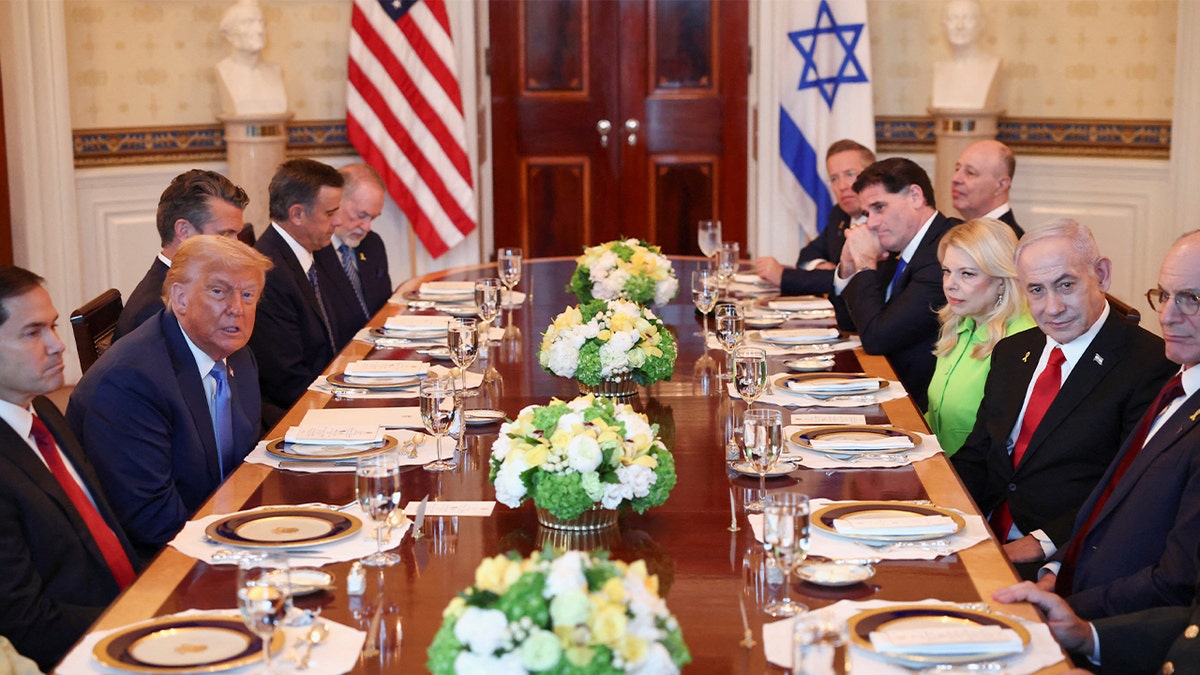
President Donald Trump holds a bilateral dinner with Israeli Prime Minister Benjamin Netanyahu, with Defense Secretary Pete Hegseth and Secretary of State Marco Rubio in attendance, at the White House in Washington, D.C., July 7, 2025. (REUTERS/Kevin Lamarque)
ISRAEL ACCEPTS TRUMP-LED CEASEFIRE PLAN THAT COULD END GAZA WAR WITHIN 60 DAYS
Trump appeared optimistic about the possibility of Israel and Hamas reaching a deal to end the war. On July 16, while signing the HALT Fentanyl Act, Trump thanked Witkoff, praising him for doing «a fantastic job» and said that there was «some good news on Gaza,» though he did not elaborate.
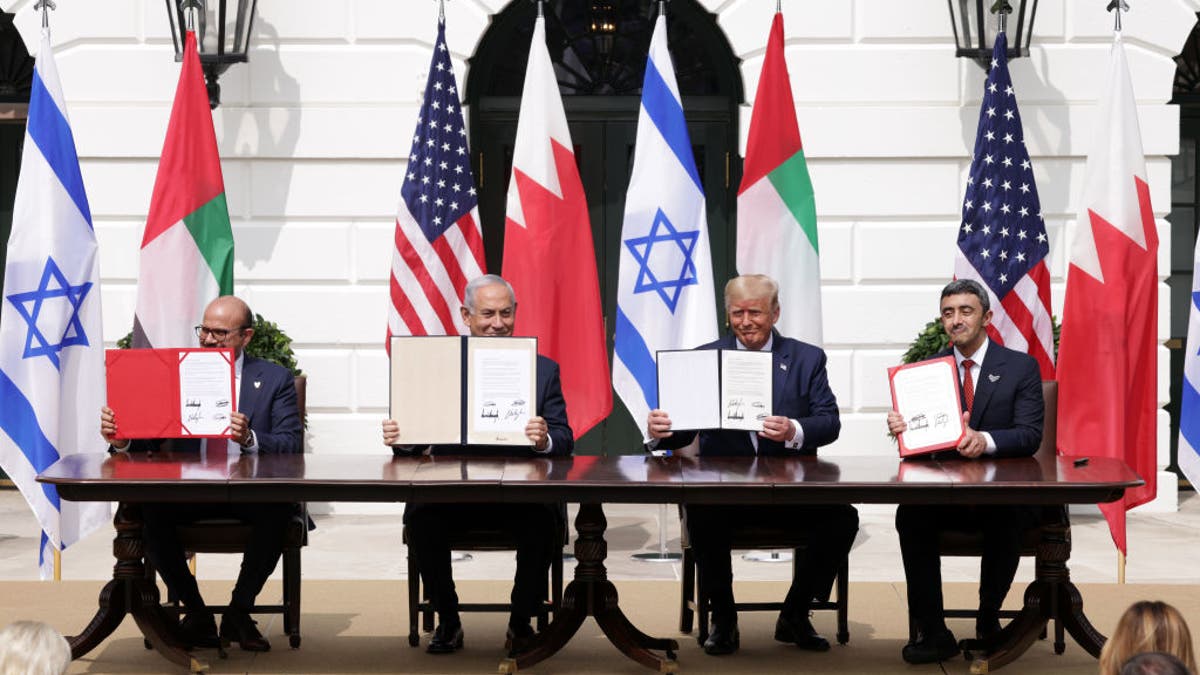
From left to right, Foreign Affairs Minister of Bahrain Abdullatif bin Rashid Al Zayani, Prime Minister of Israel Benjamin Netanyahu, President Donald Trump and Foreign Affairs Minister of the United Arab Emirates Abdullah bin Zayed bin Sultan Al Nahyan participate in the signing ceremony of the Abraham Accords on the South Lawn of the White House on Sept. 15, 2020, in Washington, D.C. (Photo by Alex Wong/Getty Images)
TRUMP PRESSURES ISRAEL TO END GAZA CONFLICT AS HE EYES ABRAHAM ACCORDS EXPANSION
If Trump can secure an end to the war, it could mean an expansion of the Abraham Accords, one of the signature efforts of Trump’s first administration, which saw Israel sign normalization agreements with the United Arab Emirates, Bahrain, Morocco and Sudan. However, Trump has yet to detail which countries would be added.
Israeli Minister of Foreign Affairs Gideon Sa’ar said on June 30 that Israel was «serious» about seeking an end to the conflict. He added that Jerusalem has an interest in «countries, such as Syria and Lebanon, our neighbors, to the circle of peace and normalization.»
CLICK HERE TO GET THE FOX NEWS APP
Fox News Digital’s Greg Wehner and Caitlin McFall contributed to this report.

 POLITICA3 días ago
POLITICA3 días agoExpulsada del Gobierno, Victoria Villarruel empieza a tomar distancia, pero no tiene proyecto político para este año

 POLITICA3 días ago
POLITICA3 días agoLa CGT evalúa adelantar a octubre el recambio de sus autoridades y define una movilización contra Milei

 POLITICA2 días ago
POLITICA2 días ago🗳️ El chamuyo de las elecciones en la Provincia: se postulan, pero no a asumen
























